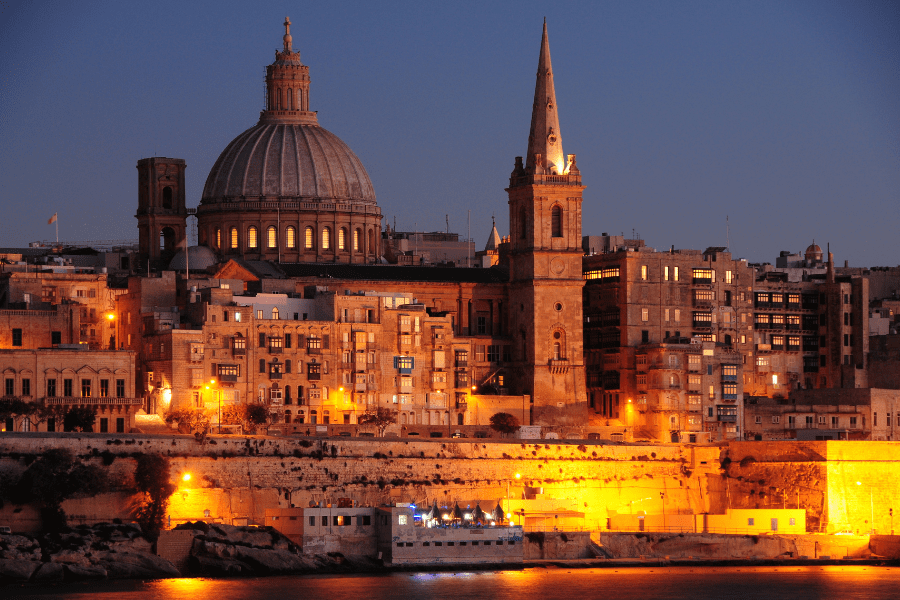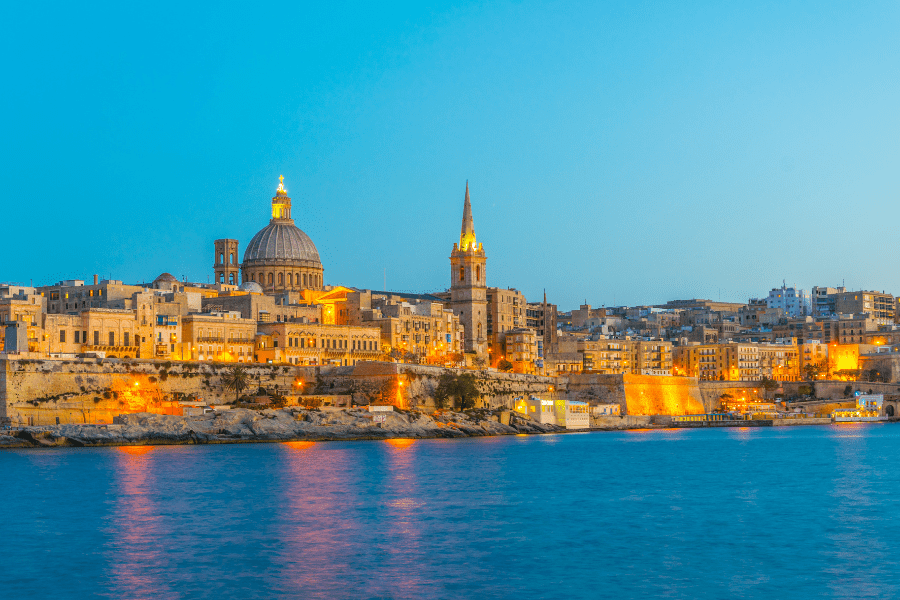Malta Tax Residency Schemes for Nomads and Non-Doms
October 31, 2024
European countries are often considered high-tax, but that’s not always true. With proper tax planning, you can live your best low-tax life even in a high-quality European jurisdiction like Malta.
With several residency options and a new route to citizenship through investment , Malta is one of the best European countries to offer foreigners a place to live and work in exchange for their investment.
Eager to know how Maltese residency can help you reduce your tax bill? Contact us , and we’d love to answer all your questions.
Malta – Country Overview
Malta is an archipelago located in the heart of the Mediterranean Sea. Its three main islands are Comino, Gozo and Malta. A gateway between Africa and Europe, Malta lies just 78.9 miles (127 kilometres) from the Italian island of Sicily.
What is the official language of Malta?
The official languages are Maltese and English, which makes Malta an excellent second residency or citizenship option for English-speaking people who don’t want to deal with a foreign language all the time while living abroad.
Is Malta part of the EU?
Malta claimed independence from Britain in 1964. It joined the EU in 2004 and adopted the Euro in 2008. Malta is also part of the Schengen Zone.
What Is the Total Population of Malta?
Malta has a population of approximately 532,95.
Benefits of Malta Tax Residency for Nomads and Non-Doms

Becoming a Malta tax resident comes with a range of tax benefits for nomads and non-doms alike. Previously, high-net-worth individuals could apply for special tax status in Malta.
However, the High-Net-Worth Individual (HNWI) Rules no longer apply. They have been superseded by the Residence Program and the Global Residence Program Rules.
The main benefit of becoming a Malta tax resident through either the Residence Program or Global Residence Program (we will discuss the differences in the requirements section below, along with the Nomad Residence Permit) is becoming eligible for a remittance basis of taxation.
Remittance-based taxation means a 15% flat tax on any foreign income remitted to Malta by those not ordinarily resident in the country.
Malta is also an ideal country to incorporate a business. If you run the entity through a holding company registered abroad, you can limit your corporate income tax obligation to a mere 5%.
Maltese authorities have set up double taxation agreements, so you avoid paying taxes in another country on top of taxes in Malta.
Moreover, Malta is as business-friendly as it gets, with a diverse community, skilled workforce, high-speed internet connectivity, and excellent living standards.
Requirements for Malta Tax Residency for Nomads and Non-Doms
The Malta Nomad Residence Permit
The Nomad Residence Permit (NRP) was launched in June 2021 by the Residency Malta Agency.
It enables holders to retain their current employment based in another country while legally residing in Malta. It’s open to remote workers who are third-country nationals, who would typically (but not necessarily) require a visa to travel to Malta as they come from non-EU jurisdictions.
You will need to provide the following documents:
- Proof of €3,500 monthly salary
- Travel document
- Health insurance policy
- Valid property rental or purchase agreement in Malta.
In addition, you need to belong to one of the three categories below:
- Be contracted to work for an employer registered in a foreign country
- Conduct business activities for a registered company in a foreign country as a partner/shareholder
- Offer contracted freelance or consulting services to clients whose permanent establishments are in a foreign country.
The permit lasts up to a year and will be renewed by the Residency Malta Agency, assuming the applicant continues to meet the set eligibility criteria. A Nomad Residence Permit holder will be considered a resident in Malta for tax purposes if they are physically present in Malta for more than 183 days in a year. However, they are not treated as an ordinary resident in Malta.
As a Nomad Residence Permit holder, you will not be subjected to Maltese income tax as long as you pay taxes elsewhere. You’ll still have to pay consumption taxes, though. The objective of the NRP was for the applicant to become a temporary resident who is not domiciled.
The Maltese digital nomad visa is only one of the 40+ digital nomad visas currently available worldwide. Check out our ultimate digital nomad visa list to know all your options.
The Malta Residence Program
The Residence Program targets EU, EEA and Swiss nationals who are not permanent residents of Malta.
They become tax residents and are awarded special tax status by signing up. Applicants tend to be ultra-high-net-worth individuals in self-employment attracted by the remittance basis of Maltese taxation.
The Malta residence by investment scheme has cemented the country’s reputation as the European destination of choice for entrepreneurs.
The Malta Global Residence Program
This residence scheme accepts applications from individuals who are non-EU, non-EEA, or non-Swiss nationals who are not long-term Maltese residents. If they want to spend more than 90 days in the country, they will generally have to apply for a national visa for themselves and any accompanying family member. This involves paying a non-refundable application fee of €300.
To sign up for the MGRP, you must make a minimum annual tax commitment of €15,000 and purchase high-value property in Malta.
What do you get for such an investment? You will be able to benefit from double taxation agreements and earn a Malta residence permit and special tax status.
The Malta Retirement Program
This is aimed at non-Maltese individuals who receive a pension as their primary source of income. Individuals under the retirement program may hold a non-executive post on the board of a Maltese resident company.
Moreover, they will be subjected to a flat 15% tax rate on non-Malta source income remitted to the country plus a €7,500 minimum tax, with an additional €500 per dependent.

Malta Tax Residency Schemes: FAQs
You become a Malta tax resident by default if you are physically present in Malta for more than 183 days a year.
The Maltese digital nomad visa process is streamlined and entirely online. Eligibility criteria laid down by the Maltese government include a yearly income of at least €42,000. An additional stipulation is a private health insurance policy.
Yes, as a tax resident, you are generally required to file a tax return in Malta, declaring Maltese source income and any foreign income remitted to Malta.
Malta tax rates non residents are generally taxed at flat rates on income sourced within the country. Unlike residents, Malta tax rates for non residents are not progressive. Specific tax rates vary depending on the type of income and applicable agreements between Malta and other countries.
The Malta residence by investment application process typically takes from a few months to over a year, depending on the complexity of the application and the due diligence process.
You can ensure compliance with the Malta tax system by maintaining accurate records and filing tax returns on time. As always, we recommend seeking professional advice from tax experts familiar with the Malta tax system and laws.
Tax residence refers to where you live for tax purposes during a particular year, while domicile is your permanent legal home. You can hold Malta tax residence without being domiciled there.
Residents of Malta are taxed on their worldwide income if they are domiciled in Malta. If they are non-domiciled, they are taxed on income and capital gains arising in Malta and foreign income remitted to Malta. The tax rates are progressive, ranging from 0% to 35%.
Should You Become a Malta Tax Resident?
If you are a resident for Maltese income tax purposes but non-domiciled, you are only subject to taxation on income and capital gains arising in Malta.
Capital gains arising outside Malta do not count as taxable income. This includes foreign pensions, thanks to the Malta Retirement Program.
Where the Malta Residence Program is aimed at EU nationals, the Malta Global Residence Program accepts applications from non-EU nationals.
They both provide a gateway to the Maltese tax system for non-domiciled residents, where no tax is paid on foreign income remitted to Malta.
Double tax relief is available thanks to double tax treaties between Malta and different countries. These tax treaties ensure you don’t pay twice the amount of tax on the same income.
With several residency programs, a digital nomad visa, a business-friendly environment, a tax- friendly regime and excellent living conditions, Malta is among the best EU countries for second residency or even citizenship .
Interested in accessing the European market through a tax-friendly, high-standard base like Malta? Reach out to us, and we will help you do just that.


Does Puerto Rico Pay Taxes to the US?
It’s a common question and one that often fuels confusion, debate, and a fair share of misinformation – Do residents of Puerto Rico actually pay US federal taxes? When most people think of US tax obligations, they naturally assume they apply uniformly across all US citizens. But when it comes to Puerto Rico, things are […]
Read more

How to Eliminate US Expat Taxes (by Renouncing)
A common myth persists among many Americans that they can’t benefit from the same tax-saving opportunities as other expats when moving overseas. That misconception is rooted in the United States’ insistence on implementing citizenship-based taxation, requiring their citizens to report and pay tax on their worldwide income – regardless of where they live. As a […]
Read more

How to Pay Zero Tax in Latin America
Latin America has a reputation among many investors as a ‘tax hell’, and its headline tax rates seem to bear out this theory. Colombia taxes top earners at 39%, Ecuador at 37%, and Chile climbs to 35.5%. Those aren’t tax rates to sniff at – they’d make a freedom-sized hole in any annual tax return. […]
Read more





